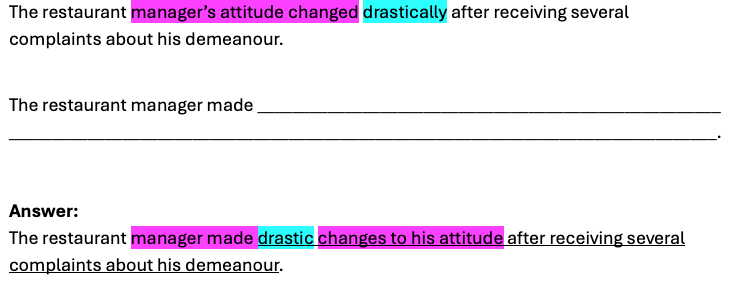2025 English WA1 Trends: Grammar & Vocabulary MCQs, Synthesis & Transformation
Reinforcing grammatical rules (like 'who' vs 'whom'), confusing vocabulary words (like 'discreetly' and 'warily'), and more.
The long weekend is almost here :) Hang in there!
In the article below, we’ve summed up our 2025 English WA1 Analysis. It covers common mistakes we spotted in Grammar MCQ, Vocabulary MCQ and Synthesis & Transformation.
You’ll also see how we apply our Captain ACE answering framework to tackle Grammar MCQ questions effectively. Go through the questions, cover the answers and practise on your own.
Trending or Emergent Themes/Question Types
We’ve identified a few key Grammar MCQ trends that are gaining prominence in 2025. Let’s take a closer look at these.
Example 1: Relative Pronoun – Who vs. Whom
The workers _____ the supervisor has assigned to construct the bridge are laying the groundwork.
(1) who
(2) which
(3) whom
(4) whose
Answer: (3) whom
Tip:
"Who" is used as the subject of a sentence, while "whom" is used as the object of the verb or preposition, particularly in more formal writing.
Captain ACE Method:
Sniff out CLUES: Focus on the sentence structure. Who is doing the action (subject)? Whom is receiving the action (object)?
Examine the options & ELIMINATE the wrong ones. If the word is acting as the subject, "who" is your answer. If it's acting as the object, "whom" is correct.
Smile to affirm correct ANSWERS. Once you've identified the right relative pronoun ("whom"), smile to confirm that you've got it right! Check that you’ve written down the correct option.
Example 2: Question Tags – Seldom/Rarely/Hardly
Ken seldom laughs at our jokes, _____ he?
Choose the correct question tag:(1) has
(2) hasn’t
(3) does
(4) doesn’t
Answer: (3) does
Tip:
The rule is: “If the statement is positive, the question tag will be negative.” And if the statement is negative, the tag will be positive.
Since "seldom" suggests the action does not happen often, the statement is negative, so the question tag will be positive.
Captain ACE Method:
Sniff out CLUES: Look for the subject (Ken) and the verb (seldom laughs). Notice that "seldom laughs" is negative, meaning it suggests "does not laugh often."
Examine the options & ELIMINATE the wrong ones: “Has” and “hasn’t” are incorrect because "has" is not used for question tags with the verb "laughs" in the present tense.
Smile to affirm correct ANSWERS: Once you've identified the right tag ("does"), smile to confirm that you've got it right! Check that you’ve written down the correct option.
Example 3: Third Conditional Sentences
Structure:
"Had we known..." / "If I had known..." → This structure is used to talk about unreal past situations.
Had we known about the deadline, we _____ the report earlier.
(1) will submit
(2) would submit
(3) will have submitted
(4) would have submitted
Answer: (4) would have submitted
Tip:
The third conditional talks about hypothetical or unreal past situations — things that didn’t happen.
The correct structure is:
"Had we known" or "If we had known" (past perfect) → sets up the condition.
"We would have" (modal + past participle) → shows the result that didn’t happen.
Captain ACE Method:
Sniff out CLUES: Look for clues like "Had" or "If," which indicate that you should use the past perfect tense. In the result part of the sentence, use "would have" to express an unreal or hypothetical past situation.
Examine the options & ELIMINATE the wrong ones: "Will" is incorrect because it's used for future situations, not hypothetical past situations. "Would have" is the correct choice for unreal past conditions.
Smile to affirm correct ANSWERS: Once you’ve identified the right option ("would have"), smile to confirm that you've got it right! Check that you’ve written down the correct option.
Challenging Questions
WA1 also included some tricky questions to challenge your skills. Here are two types of questions that you might find more difficult.
Example 1: Vocabulary MCQ
The secret rescue mission had been so _____ planned that every detail was double-checked for accuracy.
(1) warily
(2) discreetly
(3) deliberately
(4) meticulously
Answer: (4) meticulously
Why this question is considered challenging:
Distractors: The other options, such as "discreetly" and "warily," are similar in meaning but not appropriate in this context. "Discreetly" means done in a way to avoid attention, and "warily" means with caution; both don’t fit the idea of thorough, detailed planning.
Common confusion: Students might be distracted by the word "secret" in the sentence and pick “discreetly,” which could seem to match the idea of keeping things quiet, but it doesn’t emphasise the level of carefulness or detail required here.
Tip: Pay attention to the context of the sentence and how each word fits with the overall idea of careful planning.
Example 2: Synthesis & Transformation
Why this question is considered challenging:
Word form transformation: Students need to recognise that "drastically" needs to change into "drastic" to fit the new sentence structure.
“Changed” (verb) becomes “made changes” (noun + verb). This changes the verb into a noun and combines it with the verb “made.”
“Drastically” (adverb) becomes “drastic” (adjective). The adverb modifies the verb, but in the transformed sentence, we need an adjective to modify the noun "changes."
Sentence structure change: The sentence structure shifts from describing a change ("changed drastically") to expressing the action of making changes ("made drastic changes").
Context understanding: The challenge also lies in ensuring that the transformed sentence still makes sense in the given context and accurately reflects the meaning of the original sentence.
Tip:
Pay attention to word forms—ensure that adverbs are changed to adjectives and verbs are adjusted to fit the new sentence structure while maintaining the original meaning.
Common Misconceptions & Mistakes (with Tips to Avoid)
Here are a few common errors seen in WA1 and how to avoid them.
Grammar MCQ – "Neither of" vs. "Neither…nor"
Neither of the prefects, who have both been nominated for Head Prefect, _____ prepared a speech.
(1) has
(2) had
(3) have
(4) having
Answer: (1) has
Common Mistake: Many students mistakenly apply the rule of proximity used for “Neither…nor” and choose “have” because they see “prefects” (plural). However, “Neither of” means zero, so the subject is singular and requires a singular verb.
Tip: Don’t mix up "Neither…nor" with "Neither of"! Read the question carefully, and underline the key phrase to focus on the subject-verb agreement!
Synthesis & Transformation – “Not only… but also”
Student’s Answer:
My father not only goes to the community centre for cooking classes but also yoga.
Correct Answer:
My father goes to the community centre not only for cooking classes but also for yoga.
Common Mistake: Students often try to simplify the sentence too much by dropping essential parts like the prepositional phrase “for.” They focus on connecting ideas with “not only… but also,” but forget to maintain parallel structure, which leads them to omit "for" before "yoga," breaking the sentence.
Tip:
Remember, both activities (cooking classes and yoga) are at the same place, so keep the same structure. Don’t skip parts of the sentence.
We’ve also covered WA1 paper trends for English, Maths, and Science. Familiarise yourself with the trending questions and avoid making the same mistakes again!






